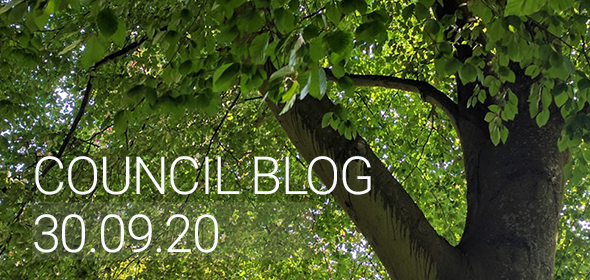Author: Philip Greenish, Chair of Council
Please note: information in this blog was accurate at the time of the meeting – 29 September 2020 – and may now have been superseded.
Council met on 29 September via Microsoft Teams. Before the meeting, Professor Diana Eccles, Dean of the Faculty of Medicine, and two of her colleagues led Council on a virtual tour of the Faculty. Together with information sent ahead of the meeting on COVID-19 related work and on medical education, the tour provided us with a good picture of the work of the Faculty and of the main challenges faced. We were hugely impressed by the quality of research and education and very pleased to see strong progress against the Faculty’s key objectives.

Council had also met informally on 9 September and we started by welcoming Tony Whitmore as the new Council member appointed from non-academic members of staff. We met primarily to consider the emerging outcome of 2020 undergraduate recruitment and its impact on the University. A huge amount of work, including during Clearing, was producing dividends and we were cautiously optimistic. We also considered the Key Performance Indicators for the Bridging Strategy (which we had approved in July), and the ongoing work to prepare the campuses for the arrival of students later in the month. This has required careful and detailed planning and an enormous effort by many people across the University.
The first substantial item on the 29 September agenda was the report from the Vice-Chancellor. Mark Smith summarised our good performance in league tables published over the summer, including our rise to 15th in the Good University Guide, highlighting the need to maintain momentum in these difficult times. He shared the latest data on Home/EU, international and PGT student recruitment which indicates overall numbers well above levels assumed in the principal scenario but slightly down on previous years. This, and the degree of uncertainty caused by the pandemic, makes long range planning difficult. On a positive note, the indications are that students due to arrive in January 2021 remain keen to do so.
The VC briefed us on national developments while emphasising the degree of uncertainty, typified by the changes in policy on A Level assessment in August. The Office for Students (OfS) has been instructed to reduce its costs by 10 per cent and to reduce bureaucracy. Council will look carefully at where we can reduce our information and reporting requirements. Finally, we discussed cyber security and vulnerabilities that remain despite our high level of preparedness. The Audit Committee is recommending further precautionary actions.
Olivia Reed, SUSU President, delivered her report. Main issues we discussed included the latest SUSU strategy and brand refreshment, good SUSU NSS results, the impact of additional teaching on Wednesday afternoons (a short-term measure), improvement in communications to students and the development of a ‘buddy’ system for arriving international students. She welcomed the plan to make the new all-weather marquees available for SUSU sole use in the evenings. We thanked Olivia and her team for their outstanding work, much of which concerns the quality of life for returning undergraduates, and for the most constructive way in which SUSU is working with the university executive.
Richard Middleton, Chief Operating Officer, updated us on the ‘active campus’ work which aims to make every aspect of our campuses as safe as possible for everyone while providing our students with high quality education and a fulfilling experience. We discussed many aspects of our preparedness and tested carefully how we would cope with the sort of problems encountered (very publicly) by other universities in recent days. We concluded that the complex and detailed preparation has covered every reasonable action we could have taken, and that the Southampton COVID testing trial is a great benefit. SUSU is integral to our plans and we have strong links with local public health officials and the police. The communications team at the University is in close contact with local and regional media. Despite our preparations, we accepted that COVID outbreaks are likely and that we must expect the unexpected. Council wants to express its sincere thanks to everyone who has worked so hard to make our campuses ready for the start of term.
We then turned to a report from Professor Alex Neill, Vice-President (Education). He emphasised the intention to provide teaching and support for students that is as broadly equivalent to our provision in a ‘normal’ year as possible. We discussed changes that had already been made and five key issues on which he was seeking guidance: conveying the value for money of our offer to students; IT poverty; obligations under our Access and Participation Plan to support students identified as disadvantaged; ensuring a positive sense of community and belonging for students; and the same for staff, many of whom will be spending much of their time working from home. We accepted that this is a rapidly evolving landscape and we should expect further evolution over the next weeks and months. We recognised how challenging this has been for academic staff and would like to thank them all for the exemplary way in which they have risen to the challenge.
We considered, and then approved, the final budget process and the principles necessary to ensure we can deliver the Bridging Strategy while remaining financially secure. A great many uncertainties remain including, crucially, our international post-graduate recruitment. The budget process has an element of flexibility to allow for some adjustment.
In other items, we took an oral report from the Nominations Committee which included plans to improve the diversity of Council, and we reviewed Council’s standing orders and some other governance documents. We formally approved the KPIs which will be used to measure the delivery of the Bridging Strategy.
Finally, we received an update from Professor Rachel Mills on the University’s Sustainability Strategy which will be published shortly. Council strongly supported the principles on which it is based.